The Republican Debate Stage Is Going To Be Awfully Crowded
The Republican debate stage in 2016 is going to be even more crowded than it was in 2012.
With the first Presidential debate among Republican candidates tentatively scheduled for early August in Cleveland, Ohio, Republicans are starting to wonder just how big a debate stage they’re going to need:
WASHINGTON — Republican leaders, searching for a fair-minded but strategically wise way to conduct the presidential primary debates, are grappling with how to manage White House contenders in a sprawling field that mixes proven politicians with provocateurs and reflects an increasingly fractious party.
The Republican National Committee’s decision last year to claim control of the 2016 debate process was welcomed by many in the party who believed that Mitt Romney, the 2012 nominee, was hurt by both the pummeling and the positions he took during the 20 debates in that primary contest.
But by trying to impose order through party-sanctioned debates and limiting the number of forums, the party may have begotten an equally messy problem: who to include on stage for a 90-minute debate from a field of nearly 20 potential candidates.
As the national committee gathers in Arizona this week for its spring meeting, it will discuss how to determine the candidates who will make the cut for the first official debate, which is set for Aug. 6 in Cleveland and will air on Fox News. But there is already a robust discussion behind the scenes, with candidates who are lagging in early polls nudging the party to take an inclusive approach in the initial forums.
It is not entirely clear who will be in charge of devising or enforcing the debate criteria — that is, if there are criteria. One member of the national committee panel charged with overseeing the debates said its members had discussed ceding the decision entirely to Fox News.
At issue is how to stage a substantive discussion that is fair to viewers and the campaigns. The party has little appetite for a forum so thick with candidates that it allows for not much more than an extended “lightning round” of questions. One Republican involved in the process said a 90-minute forum with 10 candidates would offer each candidate only four to five minutes, after subtracting commercials and moderator time.
But as the 2012 primary demonstrated, televised debates can instantaneously reshape presidential races, and candidates who face the possibility of being excluded argue that any attempt to winnow the participants so early in such a fluid primary contest would be wrongheaded.
“You really shouldn’t limit participation before the Iowa caucuses,” said John Brabender, former Senator Rick Santorum’s strategist.
To Mr. Santorum’s peers in the single digits in primary polls, the Noah’s Ark-size field is an asset to be spotlighted, not a problem to be managed.
Brad Todd, a strategist supporting Gov. Bobby Jindal of Louisiana, said the party risked refighting the last political war.
“Much of the planning for these debates was done in view of 2012 and the 2012 debates, which many saw as road bumps on the way to Mitt Romney’s coronation,” he said. “But that’s not the challenge we have this time. The challenge is how we get exposure to good candidates.”
(…)
It is a delicate matter: To rely on polling alone could mean barring current and former senators and governors from participating in debates that would offer them desperately needed political oxygen. And should excluded candidates try to attract attention by holding their own unsanctioned debates, they would be precluded from participating in future sanctioned debates, according to the rules adopted last year by the national committee.
Even thornier for the party is what to do about two high-profile contenders who have not previously been elected to office.
Many Republicans laboring to improve the party’s image recoil from the prospect that whatever debate-eligibility criteria are adopted could result in the barring of the only woman, Carly Fiorina, the former Hewlett-Packard chief executive, or Ben Carson, a retired neurosurgeon who is the only African-American candidate.
But could Republicans include Ms. Fiorina and Mr. Carson while keeping out such low-polling candidates as Gov. John R. Kasich of Ohio, Senator Lindsey Graham of South Carolina, former Gov. Rick Perry of Texas or even Donald Trump?
It is possible that the party could ultimately devise some threshold involving polling, small-dollar fund-raising, the size of a campaign’s staff or the number of events held by a candidate, potential measurements that are all being discussed.
But even the most equitable standards could mean barring statewide elected officials from competition, and party leaders are uneasy about setting off a backlash.
The fear, according to one party official, is that the excluded candidates could collectively use conservative websites and talk radio to foment anger at the so-called Republican establishment — an assault that could undermine the national committee’s hold on the debate process.
“There would be so much outrage if they didn’t start inclusively,” Mr. Brabender said. “It would look like the party was once again playing arbiter of who they want to be nominee.”
One proposal would limit the number of debate participants in the early rounds to twelve candidates:
SCOTTSDALE, Ariz. — A broad consensus is beginning to take hold among Republican party officials that the presidential primary debates shouldn’t include any more than a dozen candidates — despite the fact that there might be as many as 19 declared candidates by the time the primary debates start this August.
Though the precise criteria for debate participation ultimately will be decided by the networks staging them — and party leaders continue to insist nothing has been finalized — there is behind-the-scenes agreement here at the Republican National Committee spring meeting that the first debates should be capped at 12 candidates.
“Our goal is to accommodate as many candidates as possible at the beginning,” said Steve Duprey, the New Hampshire committeeman who chairs the RNC’s 2016 debate committee. “I think there’s consensus to cap it between nine and 12. And we may not need more than that, depending on how the contest goes. Each of the media partners may have different criteria and they’re going to evolve.”
The RNC’s preferences are merely guidelines for the media organizations sponsoring the debates. Nevertheless, the party hopes to influence the discussion by suggesting limits on the number of candidates — although in a sign of the sensitivities surrounding the idea of a hard cap, RNC spokesman Sean Spicer won’t refer to it as such.
“There’s no cap,” Spicer said during a media briefing Friday morning. “What there is are some logistical realities — you can only fit so many people on a stage. That number is being looked at constantly.”
We saw the same issue rear its head during the 2012 election cycle, of course. In the early stages of the race, some candidates who had actually declared their candidacy, such as former New Mexico Governor Gary Johnson and others, were excluded from most of the debates that took place in 2011 based largely on their position in the polls, which obviously was a source of complaint for both the excluded candidates and their supporters. Basing eligibility for a debate invitation solely on polls, they argued, was unfair in no small part because lesser known candidates were likely to place lower in the polls to begin with, and would continue to do so if voters were not aware of who they are and what they believed in, something that excluding them from debates seems to make inevitable. On the other side of coin, though, is the valid argument that having a debate with large numbers of candidates on the stage makes it impossible to have any kind of meaningful discussion on policy issues. The more candidates there are, obvious, the less time each candidate can have to answer a question. This means that many of the early Republican debates were rather pointless and involved little more than each candidate spouting sound bites and repeating media-tested phrases.
Back in 2011, the debates were all controlled by private entities such as media companies, universities, and public policy organizations who set their own rules for each debate. This time around, the debates will largely be under the control of the Republican National Committee itself, which arguably makes it much harder to exclude candidates without the party being seen as putting its thumb on the scale. Why should Ben Carson be allowed in a debate, for example, but not a sitting Governor like Bobby Jindal or John Kaisch, for example, merely because Carson is better known and doing better in a couple polls? For that matter, how would the RNC handle the questions that would inevitably arise if Donald Trump actually does enter the Presidential race (which I still say is unlikely no matter how many people he hires in New Hampshire)? Excluding someone with an out-sized personality like Trump, who regularly takes people who criticize him to task on his Twitter feed, would likely turn into a public relations disaster, but allowing him on the stage would turn the entire debate into a circus And how about former Texas Governor Rick Perry, who bombed in the debates last time but is apparently considering running for President again notwithstanding the fact that he is presently facing a criminal trial in Federal Court?
At least in the early stages of the race, it strikes me that it would be next to impossible for the RNC to exclude anyone from the debates who is a declared candidate that has an actual, active campaign in operation in the form of fundraising, appearances on the campaign trail, and at least some evidence of support even if it is quite minimal. This would inevitably mean that the early debates are going to be very crowded and not very substantive, but I don’t see any other alternative that doesn’t make the RNC look as though it is favoring some candidates over others, which is something that would cause real problems inside the party. After the first few debate, perhaps, they can start to impose conditions for participation tied to polls and fundraising, but at least in the beginning I would think that the only appropriate policy is one that allows any potentially credible candidate to participate.
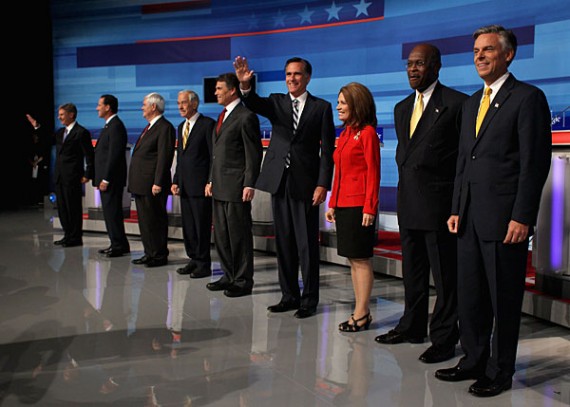

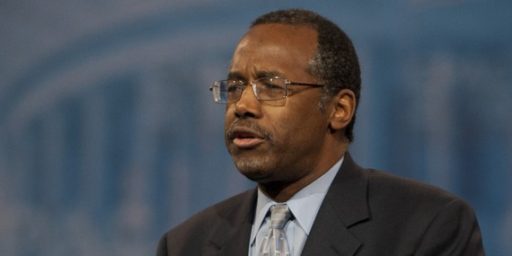
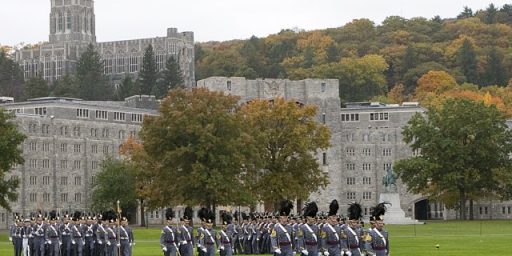
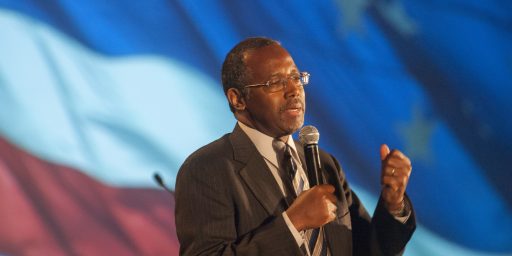
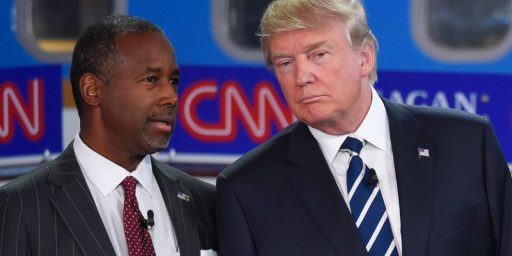
I suggest a March Madness-style bracket. We’ll start off with 1024 debates in the first round and go from there.
Just get a really, really large circus tent:
The Ringling Bros. and Barnum & Bailey® Presents The First GOP Debate, Live in Cleveland, Ohio, August 6th!
They could recognize today’s political reality and base participation on the amount of money in the candidates super PACs.
Reserve a place for Alan Keyes.
@Tim D.: One tweak – Double elimination will keep the fun alive just a bit longer.
Crowded, and yet empty. How very Zen.
What is the sound of one nut winging?
They could do it like The Voice. Have four prominent GOP billionaire backers assemble a team from the pool of candidates. Then, over the course of a month – say, this August – each team puts up one member in a 4 person debate. The “American Public” pays to vote on their favorite candidates and the lowest vote getter for the week is forced to drop from the race.
Those that emerge then go on to play GOP Survivor for the next 12 months.
Limit each debate to 4-6 participants, drawn by lot. Replace each of the currently scheduled debates with a series of debates, nightly, until you run out of batches of candidates.
Advantages over other proposals:
– time to hear each candidate
– inclusive
– candidates in later batches will be responding to the first batch, and either trying to out-wingnut them, or throw them under the bus, depending on public perception of the earlier debates.
@Gustopher: Also, make sure each candidate gets asked “Why do you love America?” — we will really enjoy the efforts each candidate makes to sound unique on this bland question that can so easily pander to the crazy.
Better idea: “Show us how you love America.” And give them three minutes. Let them all prepare for it, and bring props, costumes, assistants (dance partners?) etc.
[Aside to James and the webmaster — the ads on this site are trying to bring my computer to its knees. Either you have been hijacked or you need a different set of advertisers.]
@DrDaveT:
Adblock Plus stops it in its tracks. I hated to have to take that step, since I’ll tolerate some advertising so that sites I like can stay in business, but lately it has just gotten far too extreme and impacts the user experience. It had to go.
@DrDaveT:
Ad blo ck P lu s stops it in its tracks. I hated to have to take that step, since I’ll tolerate some advertising so that sites I like can stay in business, but lately it has just gotten far too extreme and impacts the user experience. It had to go.
@DrDaveT: Me too. I go elsewhere automatically and have very little hope this comment will actually get thru.
Success!!!
On the GOP debates, I can only say that to restrict them to “credible candidates only” will leave them with an empty stage.
@Gustopher: Fine, but no swimsuit competition.
“Dial 666-666-1 for Rick, or 666-666-2 for… uh… the other Rick.”
Honestly, ads on here have always been horrible. The usage of so many different ad providers (some of them on quite slow servers) makes the page near-unusable on mobile devices. There are also quite a few requests for no longer existing files.
I once posted a detailed break-down of worst offenders but so far only adblock helps.
Pick the top 5-6 candidates. Have them take a seat for the first 2-3 debates. Have the also-runs do a month, and fill the rest of the debates with the people that look best in those. Alternatively, do an Iowa and a New Hampshire crowd set of debates where the loonies wing and the establishment wing can duck it out to get their best 6 respectively.
@Mu: Good idea, but “skewed polling” means that nobody will agree on who the top 5-6 candidates are. Seriously, I’m just going to sit back and watch the circular firing squad do its thing like last time.